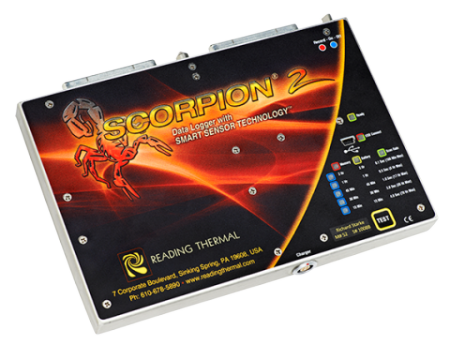Thermal profiling for commercial oven systems – made easier than ever through advanced technology such as the SCORPION® 2 Profiling System from Reading Thermal – is critical process in ensuring consistent and high-quality baking results. In the fast-paced world of commercial baking, where efficiency and precision are critical, thermal profiling offers valuable insights into oven performance, temperature distribution, and product quality.
The SCORPION® 2 Profiling System from Reading Thermal is the industry standard in thermal profiling. It captures four essential baking parameters – humidity, heat flux, air velocity, and, of course, temperature. This advanced system makes measuring and analyzing cooling, drying and baking more efficient and accurate.
Here’s some information on the significance of thermal profiling, its applications in commercial oven systems, and how it enhances baking operations.
Thermal Profiling 101
Thermal profiling involves monitoring and analyzing temperature variations within an oven during the baking process. This process typically utilizes temperature sensors strategically placed throughout the oven to collect data on temperature distribution, heating patterns and cycle times. The collected data is then analyzed to optimize oven settings, improve product quality and troubleshoot any issues that may arise.
Applications
One of the primary applications of thermal profiling in commercial oven systems is to ensure uniform temperature distribution across the baking chamber. Consistent heat distribution is essential for achieving uniform baking results and preventing variations in product quality. By conducting thermal profiling, bakery operators can identify hot spots, cold zones or areas with insufficient airflow within the oven. This information allows them to adjust oven settings, such as fan speed, temperature and conveyor speed, to achieve optimal heat distribution and uniform baking.
Thermal profiling also enables bakery operators to optimize oven settings for specific products or recipes. Different baked goods may require varying baking temperatures, times, and airflow conditions to achieve the desired texture, color, and flavor. By conducting thermal profiling tests with different recipes or product configurations, operators can fine-tune oven settings to meet the unique requirements of each product. This ensures consistent quality across product lines and enhances customer satisfaction.
Identifying Potential Problems
In addition to optimizing baking conditions, thermal profiling helps identify and troubleshoot potential issues that may affect product quality or oven performance. For example, thermal profiling may reveal temperature fluctuations, heating element malfunctions or conveyor belt issues that could lead to uneven baking or product defects. By promptly identifying these issues through thermal profiling, bakery operators can take corrective actions, such as recalibrating equipment or performing maintenance, to prevent production delays and ensure consistent product quality.
Ensuring Compliance
Thermal profiling plays a crucial role in compliance with food safety and regulatory standards. Many food safety regulations require commercial bakeries to maintain precise temperature control throughout the baking process to ensure the safety and integrity of baked goods. Thermal profiling provides documented evidence of temperature control measures, demonstrating compliance with regulatory requirements and industry standards.
As you can see, thermal profiling is a vital tool for optimizing performance, ensuring product quality, and maintaining compliance in commercial oven systems. By monitoring temperature distribution, analyzing baking conditions and troubleshooting potential issues, thermal profiling enables bakery operators to achieve consistent and high-quality baking results. As the demand for quality baked goods continues to rise, thermal profiling will remain an essential practice for commercial bakeries seeking to meet customer expectations and stay competitive in the market.
Learn more by contacting Reading Thermal online or calling 610-678-5890.

